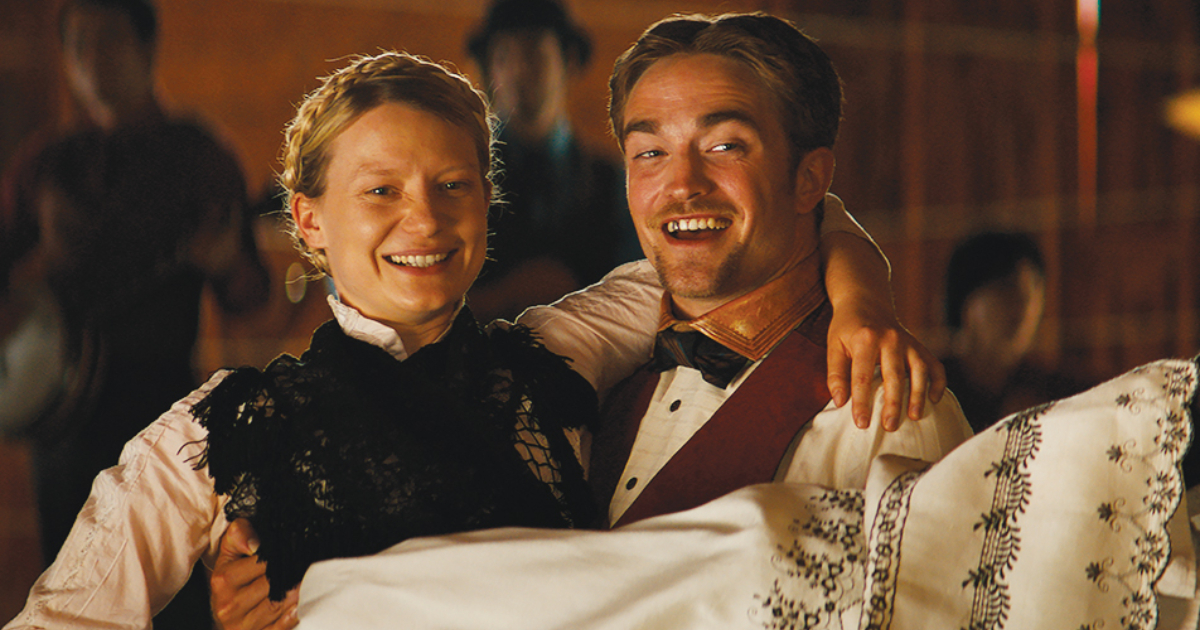
Once or twice a year, it seems, a gutsy filmmaker looking to challenge him or herself, decides that they will be the one to try and bring back to life the Western genre. Be it Kelly Reichardt with the masterful anti-Western Meek’s Cutoff or Tommy Lee Jones giving a decidedly esoteric spin on the genre, this seems to be the breeding ground for directors either trying to challenge themselves or spin a yarn in a genre they’ve always had a passion for.
And then there’s a film like Damsel. From Kumiko, The Treasure Hunter directors David and Nathan Zellner, Damsel isn’t so much a Western as a road picture in Western garb, but its look at love and masculinity is nonetheless captivating when taken as part of this genre’s tradition.
A thrillingly dry spin on the road trip film, Damsel introduces the viewer to Samuel Alabaster (Robert Pattinson), a seemingly wealthy pioneer with a penchant for language as flowery as his collared shirts. On the hunt for his kidnapped paramore Penelope (Mia Wasikowska), Alabaster encounters a down on his luck drunk trying to stay alive by acting as a lonely traveling preacher. As the pair make their way across the frontier, veneers are slowly worn away, until truths are revealed that upend the entire story being woven before hand. The roles of hero and villain, savior and victim, are subverted once all parties are brought in contact with one another, and while the film may be a tad long in the tooth, the final act becomes an absolute doozy.
The real doozy, however, is the film’s aesthetic. The Brothers Zellner have become indie darlings following films like Kumiko and the underrated Kid-Thing, but this is their most assured work to date. With both brothers starring in the film as well (they wrote the damn thing too), this is a true statement for the pair, making the most of the stunning locations and top level talent. Shot by frequent Jeff Nichols cinematographer Adam Stone, Damsel is a gorgeous, almost painterly piece of filmmaking that takes expertly composed frames that are as static as they are full of tactile detail (again, Pattinson’s wardrobe is deliciously textural, for example) and sets them against vibrant landscapes. The nature of the road movie makes this a varied experience, sending us to verdant forests as often and as desolate deserts, allowing for the picture to have some real scale and a grand overall scope.
The photography itself is warm and fitting of this type of period design, which isn’t the case for the superlative, but oddly verbose screenplay. It’s not odd that a film of this nature would have a verbose script, but what makes this a bizarre piece of writing is the mixture of verbiage. You’ll have a character speak in a period-proper cadence and with period-proper language, that will all of a sudden garner a very modern response that is at once jarring and also brazenly funny. There’s a genuine sense of humor here, a dry and blunt humor that makes this a truly one of a kind experience. Performances are across-the-board great, particularly Pattinson and Wasikowska, both of whom give themselves over not only to this type of anarchic physical comey, but also make each bizarre line reading feel natural and of a piece. It’s some of the best work both performers have given in their careers, and David Zellner as the drunkard Parson Henry is the film’s underlying sense of heart and humanity. Under the surface of this black comedy is a very serious dissection of love and loneliness, as well as a film interested in subverting genre tropes that see our hero spun out of his glory and into the world of toxic masculinity and the “damsel” as a woman with agency she’s more than willing to use. It’s really an astounding piece of commentary in the body of a genre film that’s about 20 minutes too long.
While it certainly does overstay its welcome and with a sense of pace that leaves the quieter moments to linger far too long, Damsel is a masterfully told spin on Western conventions that will hopefully have a long life as a cult classic.



